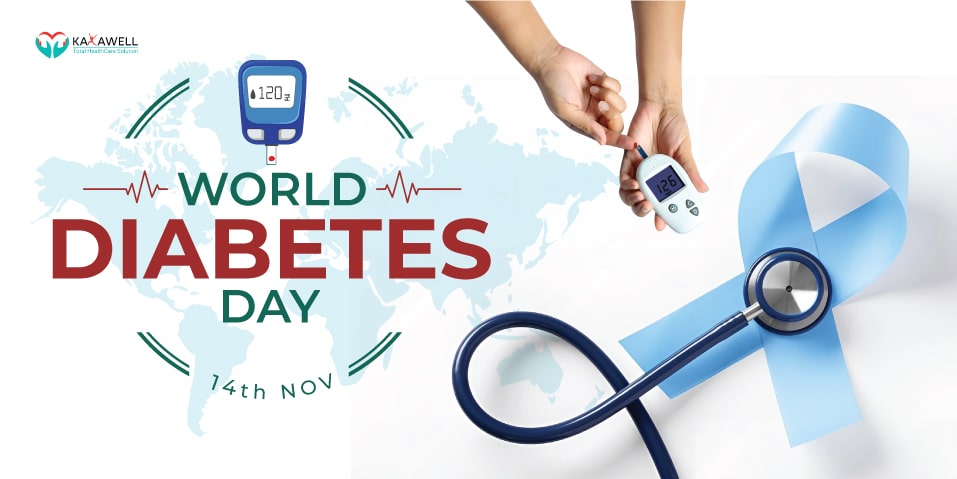World Diabetes Day is a global celebration that brings together people with diabetes, health care providers, and the general public to fight diabetes.
On 14 November, the celebration of World Diabetes Day celebrated the birthday of Sir Frederick Banting in 1922 with Charles Best for the discovery of insulin. World Diabetes Day was founded in 1991 by the International Diabetes Federation and the World Health Organization to highlight the escalating health threat posed by diabetes. Through passing United Nations Resolution 61/225 in 2006, World Diabetes Day became an official United Nations Day.
The World Diabetes Day campaign aims to:
- Be the forum during the year for supporting IDF advocacy activities.
- Be the global catalyst for fostering the value of organized and concerted efforts as a vital global health concern to resolve diabetes.
The movement is portrayed by the emblem of the blue circle, which was introduced in 2007 after the passage of the UN Diabetes Resolution. The global symbol for diabetes awareness is the blue circle. This means that the global diabetes community is united in response to the diabetes epidemic.
Why is November 14th world diabetes day?
In the diabetes calendar, November 14th is an important date since it marks the birthday of Frederick Banting, the man who co-discovered insulin. In 1922, alongside Charles Best, Banting discovered insulin.
What is diabetes?
Diabetes is a chronic disorder in which a person has elevated blood glucose levels, either because he or she does not produce enough insulin or because the body does not respond properly to insulin. Insulin is a pancreas-produced hormone that allows glucose to be used for energy production by body cells. Over the long term, hyperglycemia is associated with body damage and the loss of multiple organs and tissues.
Why world diabetes day is important?
1. It focuses on the diabetes crisis,
Diagnoses of diabetes rose by approximately 380 percent over a 25 year period (from 1988 to 2013). And these diagnoses are dangerous, with the World Health Organization forecasting diabetes to be the world’s seventh leading cause of death by the year 2030. This situation needs focus, and that is why it is important to have a whole day devoted to it.
2. Type II diabetes can be prevented by
As a reminder, World Diabetes Day serves to live our lives more healthily. Via a balanced diet, periodic physical activity, and maintaining a regular weight, type II diabetes can be reduced. Tobacco use often exacerbates type II diabetes and is better stopped.
3. It is a reminder to be vigilant about diabetes.
Type II diabetes has raised to epidemic proportions, but it is just as severe a health threat as type I diabetes, formerly known as juvenile diabetes. Type I diabetes is diagnosed in about 1.25 million Americans, but the cause of the condition is unclear. The health risks, however, are just as devastating as type II diabetes. World Diabetes Day is a reminder to learn, get screened, and receive care for the symptoms of diabetes.
Types of diabetes
Three major forms of diabetes exist:
· Type 1 Diabetes
Type 1 diabetes is typically triggered by an auto-immune reaction where the cells that contain insulin are targeted by the body’s protection mechanism. The disease can affect people of any age, but in children or young adults, it typically progresses. To regulate the levels of glucose in their blood, people with this type of diabetes need regular insulin injections.
· Type 2 Diabetes
Type 2 diabetes accounts for a minimum of 90 % of all diabetes cases. It is characterized by insulin resistance and relative insulin deficiency, which may be present either or both at the time of diagnosis of diabetes. Type 2 diabetes can remain undetected for several years and when a condition occurs or normal blood or urine glucose test is performed, the diagnosis is always made. It is often, but not always, associated with being overweight or obese, which can cause insulin resistance and lead to high levels of blood glucose.
· Gestational Diabetes (GDM)
Gestational diabetes (GDM) is a form of diabetes which during pregnancy consists of high levels of blood glucose. It occurs in one in 25 births worldwide and is associated with both mother and baby complications. GDM usually disappears after birth, but there is an increased risk of developing type 2 diabetes later in life for women with GDM and their children. Around half of women with a history of GDM expect to develop type 2 diabetes within five to 10 years of childbirth.
What are the general symptoms of diabetes?
The symptoms of diabetes are caused by rising blood sugar levels.
- Increases in hunger
- Increases in thirst
- Loss of weight
- Frequent urination frequent urination
- Extreme exhaustion
- Sores that do not heal
Some common symptoms of male diabetes are decreased sex drive, erectile dysfunction, and poor strength of the muscles.
Some common diabetes symptoms found in women are infection of the urinary tract, infection of the yeast, and dry and itchy skin.
Therefore, World Diabetes Day is celebrated annually on 14 November and is the largest diabetes campaign in the world to raise awareness of diabetes, treat it, and provide education as well.

Leave a Reply
You must be logged in to post a comment.